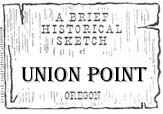|
|
Union Point |
|
|
Everett Earl Stannard wrote an article on Union Point, the gist of which follows (179): ——It will not be long before there will not be a living being who can speak from remembrance of old Union Point. It has vanished “hair and hide”. Few persons can even point out its place of existence. It was not a large place but one might also say that Oregon City was not a large place. There was a school, a church, two stores, a blacksmith shop, a gun shop, several dwellings. This much at least is sure. The founder, life and genius was Rev. Wilson Blain, pioneer of 1848. When he first came to Oregon he settled at Linn City, across the Willamette from Oregon City. Linn City was swept away in the flood of 1861—62. Union Point is now the ghost town par excellence. You’ll have to do to
some very tall searching find even the foundation stones of its stores or
other buildings. L. E. Blain, son of Wilson
Blain, went there from Albany and stood musing on the site of Rev. Blain’s dwelling. He was
able to locate the site of the orchard and found a few shoots of historic plum trees that
once came from Oregon's first
nursery. John Wilson was the proprietor of Union Point. He was
called “Gunder Wilson. Hugh Dinwiddie and a brother also lived there.
John W. C. Blaird was the village blacksmith. Burns had a store. Dad
Griffith owned the land claim, west of Rev. Blain’s. Rev. Blain taught
the first school there — and built the schoolhouse in 1851. The church
was probably built in 1855. How Union Point got its name is well known. It was in the house of the Rev. Wilson Blain that representatives of diverging branches of the Presbyterian Church met and formulated plans for merging. Rev. Wilson L. Blain was born in Chillicothe, Ohio on February 28, 1813 and died at Oak Point, Oregon, February 22, 1861 (180). He was ordained minister in 1838 and come to Oregon as a missionary in 1848 for the Associate Reformed church of the Presbyterian faith (181). Besides his religious duties the Rev. Blain found time to edit the Oregon Spectator from the fall of 1849 to September 5, 1850 (182). He was active in early public affairs and during 1849-50 was Territorial Printer and he was a member of the first Territorial Legislature (180). On June 18, 1849, he organized the church at Union Point, moving there in 1850 and becoming its pastor, continuing until his death (181) and also teaching in the academy there. He married Elizabeth Wilson and they had three sons and three daughters (l80) That Rev. Wilson Blain was a restless and ambitious soul is shown by the fact that he left his Linn City preaching to take up a donation claim in the comparative wilds of Linn County. That he early contemplated the establishment of a town on his claim is indicated in a letter written to his friend Asahel Bush, publisher of the Oregon Statesman, in which he said: -— "I have a location here which possesses many peculiar advantages as a central, beautiful and healthful village site, and an academical institution. There is within three quarters of a mile of our place an extensive deposit of argillaceous rock which will be invaluable for building purposes. When first taken from the quarry it is so soft that it can be hewn with an ax and dressed with a jack plane. It soon hardens on exposure, and proved more durable than brick. It is not injured by fire.” In the same letter he observes (183): — “Men bound to the gold mines are passing our door almost hourly for some weeks past; so that I should suppose the male part of the population below this place must be pretty much gone to the far famed gold bluffs.” There is small doubt but that Rev. Blain believed that his town would become a busy trading point and the social center of the region, for he continued active in an effort to get mail service and in trying to get new settlers to establish themselves there. In 1861 Union Point was still listed as a post office (184). An academy was started in a modest way at the home of
Rev. Blain and passed through the usual vicissitudes that beset
pioneer enterprises. Its growth and importance for a while hung on which of
the aspiring Linn County terms would emerge victor in the county seat
contest. Union Point was in the race, and when Albany won, the star of Union
Point began to set. In a letter written in 1856 Rev. Blain put down his
misgivings about the future of the Academy. In 1857 it was plain that the school was
not
prospering, and there were no funds with which to run it. On January
16, 1858, another sign of the waning of Union Point appeared in the
petition to the legislature signed by Hugh Dinwiddie, Rev. Wilson Blain
and John Barsell, asking that a certain part ‘of the plat of the town be declared legally vacated. When Rev. Wilson died
in 1861, the doom of Union Point was sealed. It had
its root in his ambitions and, when he was no more, its existence lost
its justification.
|
Union Point Quick Facts Location: Twp 14S, Rge 2W, Sect 18 Name Origin: see notes Post Office Established: 18 Feb 1854 First Postmaster: William Blain Discontinued: 18 Aug 1859 |
||
Town histories were abstracted from: "History of Linn County",
Compiled by Workers of the Writer’s Program, Works Progress
Administration, 1941. See bibliography
for above-cited references. All photos from the collection of Lisa
L. Jones, unless otherwise noted. Lisa
L. Jones contributed and is solely responsible for the content of
these pages. Copyright 2001.
